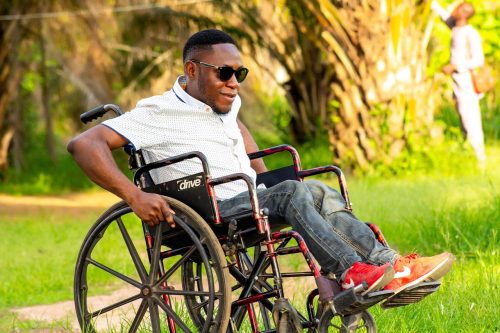Anxiety can be distressing and draining. This condition can make the person lose opportunities in their education or work. In some situations, their relationships can also be affected by anxiety disorders. Managing this type of mental health condition or helping creative talents, lawyers, or other workers with this disorder is dependent on its type or one’s preferences. Often, there must be involvement of a combination of various forms of exposure therapy, medications, and counseling for creative talents, lawyers, etc. Often the combination of these two can provide a benefit.

Anxiety disorder is prevalent among adults and children alike. People with anxiety aren’t uncommon. Almost 20% of adults and 25% of young adults in America aged between 13 and 18 are experiencing this condition, and it can affect their health too. The National Institute of Mental Health reported this. Additionally, more than 5% of teens experiencing this form of mental health disorder are categorized as severe.
Causes Of Anxiety
According to the American psychiatric association, anxiety can be caused by a combination of biological, environmental, and psychological factors. Here are some of the common causes of anxiety:
1. Biological Factors
Genetics can play a role in the development of anxiety. Studies have shown that individuals with a family history of people with anxiety disorders may be more susceptible to developing themselves. Neurotransmitters, such as serotonin and dopamine, can also play a role in anxiety.
2. Environmental Factors
Traumatic events, such as abuse or a natural disaster, can be triggering factors. Chronic stress, such as work-related stress or financial stress, can also contribute to anxiety. Substance abuse or withdrawal from drugs or alcohol are also factors to consider.
3. Psychological Factors
Negative thinking patterns, such as catastrophizing or overgeneralizing, can contribute to anxiety. Personality traits, such as perfectionism or low self-esteem, can also play a role. Additionally, a history of other mental disorders or mental illnesses, such as depression, can also be a risk factor.
Anxiety is a complex condition. The causes may vary from person to person. It is also common for multiple factors to contribute to the development of anxiety. Understanding the causes can help individuals to identify potential triggers and develop effective coping strategies. If you are struggling with anxiety, it is important to seek professional help from mental health professionals.
Major Types Of Anxiety Disorders
Panic Disorder
This is characterized by constant panic attacks with the likes of symptoms of anxiety such as trembling, sweating, choking sensation, shortness of breath, racing heart rate, and feelings of dismay and terror. These attacks occur abruptly or without warning. Individuals who have panic episodes are always afraid of anticipating the next episode and its physical symptoms, which causes them to limit themselves or modify their usual activities.
Generalized Anxiety Disorder (GAD)
This is marked by constant apprehension or anxiety. Individuals diagnosed with this condition are concerned about several things, like finances or health issues. They may experience an overall sense that something unpleasant is about to happen. Indications include irritability, restlessness, trouble focusing, a feeling of always being on edge, and finally, sleep problems, among others.
Obsessive-Compulsive Disorder (OCD)
Obsessive-Compulsive Disorder is described by obsessions or uncontrollable thoughts and feelings, along with rituals and routines are known as compulsions. Some typical examples are compulsive washing of the hands due to fear of dirt or germs or continuous checking for errors.
Posttraumatic Stress Disorder (PTSD)
Posttraumatic Stress Disorder can occur following extreme emotional or physical symptoms of trauma like a grave accident, a natural disaster, or a devastating crime. Indications include terrifying thoughts that disrupt a person’s daily routine for days, months, or even years after the tragic incident. Nightmares and traumatic flashbacks are also common symptoms of PTSD.
Phobias
Phobias are exaggerated fears about particular things (snakes or bugs, for instance) or circumstances (like flying or riding bikes) that are upsetting or invasive.
Social Anxiety
This is social anxiety disorder, also called social phobia. Individuals who experience this type of disorder are scared of social events in which they may feel criticized or humiliated. They are usually nervous when they are in social settings. Also, they are very self-conscious when facing a lot of people. They often worry that people around them will judge or offend them. Other typical symptoms include sweating, avoiding social events, excessive anxiety for days before a coming speech or event, and feeling jittery or dizzy in the middle of a social situation.

Self-Help Strategies For Managing Anxiety
According to the Anxiety and Depression Association and Diagnostic and Statistical Manual, mental health conditions can be debilitating condition. Hence, it is important to seek professional help and treatment if you are struggling with anxiety and depression disorders. However, there are also self-help strategies that you can use to manage your anxiety. Here are some effective self-help strategies for managing the symptoms of anxiety:
- Exercise or physical activity: Regular exercise can be an effective way to reduce anxiety. Exercise releases endorphins, which are natural mood-boosting chemicals in the brain. Aim for at least 30 minutes of moderate exercise each day.
- Relaxation techniques: Practicing relaxation techniques can help to calm the body and mind. Techniques such as deep breathing, progressive muscle relaxation, and visualization can help relieve symptoms or reduce anxiety symptoms and curb the disorder.
- Mindfulness practices: Mindfulness is the practice of being present and fully engaged in the current moment. Mindfulness meditation can help to reduce anxiety, support stress management, and improve overall well-being.
- Healthy lifestyle choices: Eating a healthy diet, getting enough sleep, and avoiding alcohol and drugs can all help to reduce anxiety symptoms. It is also important to avoid caffeine, as it can increase anxiety symptoms.
- Keep a worry journal: Writing down your worries can help you to identify patterns in your thinking and develop coping strategies. Set aside a few minutes each day to write down your worries and brainstorm ways to address them.
- Practice self-compassion: Be kind to yourself. Practice self-compassion. Recognize that anxiety is a common condition and that it is okay to struggle with it. Give yourself credit for taking steps to manage your anxiety.
- Practice gratitude: When you feel anxious, it can be helpful to shift your focus to the positive aspects of your life. Practicing gratitude involves intentionally focusing on the things that you are thankful for. This can help to shift your mindset away from negative thinking patterns and reduce anxiety.
Remember that self-help strategies are not a substitute for professional help. If your anxiety is interfering with your daily life, it is important to seek help from a mental health professional.
Frequently Asked Questions
What Are The 6 Variations Of Anxiety Disorders?
The six variations of an anxiety disorder include social anxiety disorder, panic disorder, specific phobia, agoraphobia, separation anxiety disorder, and generalized anxiety disorder.
What Can You Do For Severe Anxiety?
The usual management for anxiety entails talk therapy and psychological counseling or psychological therapies. This may involve psychotherapy, including cognitive-behavioral therapy or a combination of CBT and counseling.
What Is The Best Medicine For Anxiety And Panic Attacks?
Anti-anxiety medications such as Klonopin, Xanax, Ativan, and Valium effectively alleviate anxiety and panic attacks within 30 minutes to one hour. People who are experiencing a panic episode or a bout of severe anxiety often take these medications. Other solutions might include therapy CBT, or other methods.
How Can I Get Rid Of Anxiety?
Here are some healthy and safe tips to help you get rid of your anxiety:
- Avoid drinking too much caffeine and alcohol.
- Eat healthy and well-balanced food.
- Get sufficient sleep
- Spend quality time with family and friends
- Practice deep breathing and counting
- Be physically active
- Do the best you can
What Is Bad Anxiety?
Bad anxiety is officially a generalized form of anxiety disorder characterized by exaggerated tension and nervousness, even when there is no trigger.
What Activities Helps In Reducing The Symptoms Of Anxiety Disorder Naturally?
Some tips that may help reduce your anxiety naturally include:
- Staying active. Exercising is great for emotional and physical health problems.
- Quitting smoking
- Avoiding too much caffeine and alcohol
- Getting enough sleep
- Practicing meditation, mindfulness, and deep breathing
- Eating healthily
What Vitamins Help With Reducing The Symptoms Of Anxiety Disorder?
The most recommended vitamins and supplements for anxiety and panic disorder may include Ashwagandha, L-theanine, vitamin D, valerian root, and magnesium.
What To Tell Someone Who Has Anxiety?
Here are some things that you can tell a person who has anxiety:
- Ask him what’s wrong or what’s worrying him.
- Encourage him after he has confided about what’s wrong.
- Provide support willingly and gently.
- Share some personal stories that are related to the person’s anxiety.
- Don’t forget to ask the person what he needs.
What Is The Strongest Anti-Anxiety Pill?
The most effective anti-anxiety medications that can produce immediate relief are drugs called benzodiazepines. Among the popular benzodiazepines available today include Xanax, Librium, Klonopin, Ativan, and Valium.
How Do You Calm A Person With A Panic Attack?
To help you ground yourself when you have a panic attack, you can start drinking a glass of water. Breathing deeply and calmly can also help. You can take a short walk so you can forget the tension for a while. Save the taste of food or the smell of flowers. Finally, try to do something and keep moving to keep your mind off the negativity.
How Do You Describe An Anxiety Attack?
An anxiety attack is a strong feeling of losing yourself or going crazy. You develop chest pains and heart palpitations. You may have difficulty breathing and sense a fear of imminent danger nearby.
What Happens To A Person During An Anxiety Attack?
The adrenaline rushes through your bloodstream, forcing your body to be on red alert. Your vitals, including your pulse and heart rate, increase, sending more blood throughout the muscular system. Additionally, your breathing becomes quick and shallow. Remember: anxiety disorder is part of several real health conditions with physical and mental symptoms.
Does Your Anxiety Worsen With Age?
Anxiety doesn’t essentially worsen with age, but the number of individuals that go through anxiety changes over time. Anxiety incidence increases with old age and is actually most prevalent in middle-aged individuals. However, certain types of anxiety affect different people. For example, separation anxiety happens very often in children.
What Are The Most Effective Coping Mechanisms To Help Manage This Mental Health Disorder?
What Are The Negative Emotions That Usually Arise When One Has Anxiety?
Who Is Most Likely To Experience Anxiety?
How Does Anxiety Impact One’s Mental Health?
Why Does Having An Anxiety Disorder Result In So Many Problems?

Bottom Line
Managing an anxiety disorder is centered on prescription medication, lifestyle modifications, and psychological therapy. Talking about anxiety and its treatments, a treatment plan will vary for each individual and is dependent on the type of anxiety disorder that he has and the existence of other conditions.
Self-management is the initial step for dealing with anxious feelings and frequently entails having an active lifestyle, proper time management, and practicing relaxation strategies. If these actions do not help relieve anxious symptoms, consulting a doctor or mental health provider and seeking other treatment forms are equally wise options.
Also, if symptoms are already severe from the start, for instance, in the form of panic attacks, this is an indication that you need to be professionally treated. Cognitive-behavioral therapy and other types of therapies can help individuals adjust their responses to stressful life situations and triggers. Therapies can also help control misleading thoughts and replace negative ideations.
Finally, medications that can be used in conjunction with other treatments for anxiety disorders, including beta-blockers, benzodiazepines, and antidepressants, can definitely help control anxiety symptoms. They are recommended and controlled by your mental health provider doctor.



















